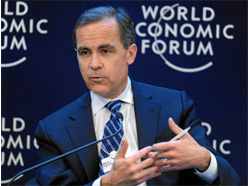
Mark Carney, governor of the Bank of Canada and Christine Lagarde, managing director, International Monetary Fund (IMF), among others at the 43rd World Economic Forum Annual Meeting, have sounded a cautionary note about the fragile nature of the global economic recovery even if it faces fewer challenges this year, says a World Economic Forum news release.
Refuting some claims made in Davos that these risks have been reduced or totally eliminated, Carney was quoted in a WEF news release as saying, “There are still tail risks out there.”
While central bank action is crucial, said Carney, this needs to be reinforced at the national level on the fiscal and structural sides, “and neither of those agendas are anywhere being finished.”
Read: WEF: liquidity bubble a risk as economy improves
The global economy faces fewer headwinds in 2013 compared with last year and will likely grow a modest 3.5%.
“Some good policy decisions have been made in the various corners of the world, including by central banks,” said Lagarde. “In 2013, they have to keep the momentum.”
She called on Europe to operationalize the new tools policy-makers have recently devised, including Europe’s banking union.
Lagarde also credited the United States with making significant progress on fiscal consolidation, an achievement that she said tended to be overlooked.
Japanese and Chinese representatives expressed hope and for the growth of their respective economies while assuring they will continue to work through existing issues.
In Japan, the new government of prime minister Shinzo Abe has just unveiled a new economic policy that has been quickly dubbed “Abe-nomics”.
Akira Amari, minister for economic revitalization and minister for economic and fiscal policy of Japan, described the new tack as “a clear commitment to pro-growth policies”, designed to reverse Japan’s prolonged deflation and accelerate GDP growth.
Read: WEF founder Schwab fears economic collapse
China provides another bright spot. “After seven quarters of slowing growth, the economy headed up in the last quarter,” said Yi Gang, deputy governor, People’s Bank of China. The economy will grow about 8% in 2013, he added.
Domestic consumption is becoming a more important driver of growth as evidenced by the steady shrinking in the current account surplus, a trend encouraged by China’s macroeconomic policies.
Africa is the third bright spot. “The IMF has revised its outlook for the continent upwards to 5.7%,” noted Trevor Manuel, minister of the National Planning Commission (NPC) of South Africa.
The outlook for emerging markets and low-income countries is much higher, at 5.5%, than for the developed nations, at 1.5%. But any notion of a decoupling is misguided.
“We now live in a globalized world,” said Yi. What happens in Europe and the United States will affect China, Asia, Africa and other economies.